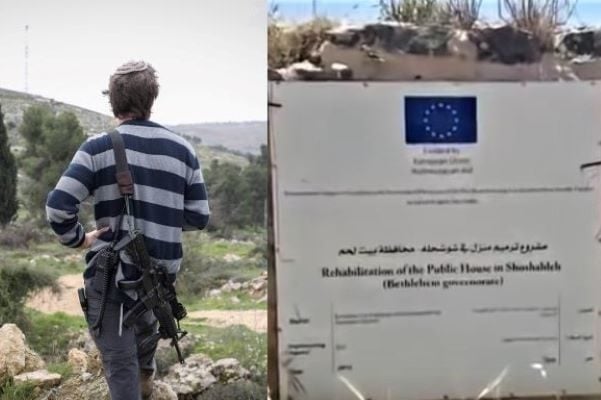Regavim NGO says that EU is funding Palestinian construction which undermines a two-state solution with Israel.
By World Israel News Staff
The European Union (EU) condemned Israel again for “settlement” construction and expansion notwithstanding the fact tha much of this activity takes place in Jewish areas of Jerusalem.
“On May 29, the Israeli authorities published tenders for over 800 settlement units in the settlements of Ramot and Pisgat Ze’ev in occupied East Jerusalem,” accused the latest EU statement on the matter.
Israeli officials in the past highlighted the fact that while these two neighborhoods are situated in territory that became part of the State of Israel in 1967, the territory was not an established Arab-populated area.
The EU in its recent statement, argues that building in these neighborhoods undermines “the possibility of a viable two-state solution.”
In reality, Ramot and Pisgat Ze’ev have never been viewed as areas eligible for Israeli withdrawal as part of a final status arrangement with the Palestinians.
This weekend’s confrontation between the EU and Israel comes amid continuing allegations by the Regavim NGO that the EU is funding “whole new villages” for Palestinians in Area C of Judea and Samaria, which are under full Israeli control under the terms of the Oslo Accords.
“None of these places are random,” says Naomi Linder Khan, head of the international division of Regavim, which monitors and pursues legal action in the Israeli court system against illegal construction undertaken by Palestinians or Bedouins.
“They’re strategic choices,” she told World Israel News, adding that the strategy involves “taking settlement blocs and cutting them off.”
Previous Israeli-Palestinian negotiations have mapped out areas in Judea and Samaria where Israel maintains blocs of Jewish communities as regions where Israel would maintain control even with the establishment of a Palestinian state. Areas of isolated Israeli communities in Judea and Samaria would be subject to negotiation for potential dismantling.
However, says Linder Kahn, if the Palestinian Authority (PA), with EU backing, builds in the areas of the blocs, they are, in fact, the parties who are guilty of undermining a two-state solution.
She gives an example of Palestinian construction in an area “connecting Gush Etzion to Jerusalem” where such building breaks up an Israeli bloc and does so under false pretenses.
“A joint project of the Palestinian Authority and the European Union is taking over a strategic area in the center of Gush Etzion, ‘restoring’ a historic village that never existed,” Regavim explained on its Facebook page.
“The signs posted on the refurbished buildings, proudly bearing the European Union emblem, explain that the site is an ancient village – ‘Shoshkhalah’ – despite the fact that aerial photos paint a completely different picture,” says the NGO.
“Over the course of the last two years,” says Yishai Hemo, Regavim Field Coordinator for Judea and Samaria, “activists from the Arab town Al Khader, backed by Palestinian Authority and European Union funding, occupied the ruins of two ancient…primitive stone structures used by passing shepherds or farmers as shelter from the elements during the changing seasons that dot the landscape in the Jerusalem and Sataf areas. They renovated these abandoned structures and turned them into homes, and from that point, in very short order, totally new structures have been added in the surrounding area,” explains Hemo.
“In the last two years, more than 15 homes have been built in this ‘village,’ each connected to infrastructure that provides solar-generated electricity and water from tanks paid for by the Europeans,” says Regavim. “Analysis of aerial photos from 1967, as well as historic maps dating back to 1880, prove that there was never any settlement of any kind at the site,” the NGO adds.
This, says Linder Kahn, is a systematic process that is changing the landscape and reducing the chances for the kind of political solution between the PA and Israel which the EU defends when condemning Israeli construction in Jewish areas of Jerusalem.





